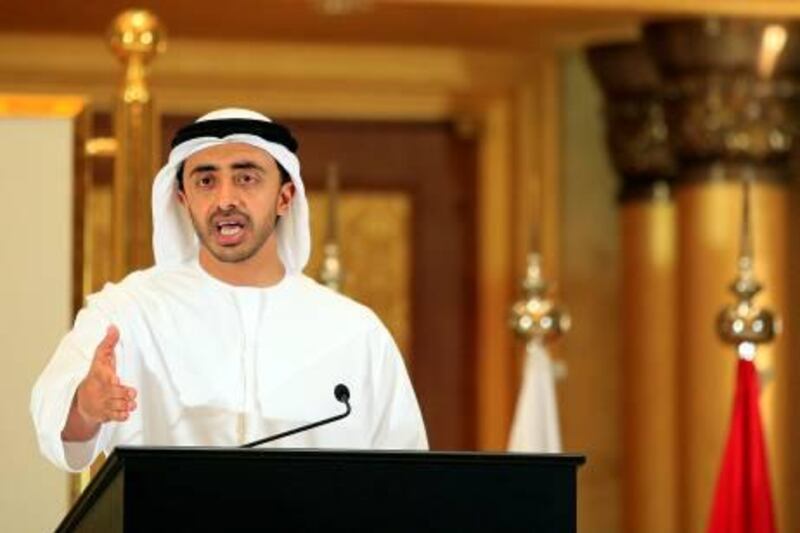ABU DHABI // The UAE's foreign minister struck a conciliatory note on Iran yesterday, saying he hoped the UN would eventually lift its sanctions on the Islamic Republic, but the country needed to come clean to the international community on its nuclear programme.
Sheikh Abdullah bin Zayed, the Minister of Foreign Affairs, urged a "once and for all" peaceful resolution to the stand-off over the nuclear programme that would allow Iran to be a productive partner to the Gulf countries.
"Actually, we want the [UN] Security Council to go back and end these sanctions on Iran, but Iran has to help the international community do so as well," he said.
At a wide-ranging press conference with Abdul Rahman al Atiyyah, the GCC secretary general, Sheikh Abdullah addressed a range of issues including Iran's nuclear programme, its occupation of the UAE's islands, Yemen's ongoing crisis, allegations published on the whistle-blowing website WikiLeaks and Israel's "stubborn" stance on peace talks.
Sheikh Abdullah stressed that Iran had a right to a civilian nuclear programme.
While Gulf countries had no independent analysis that showed Iran was seeking nuclear weapons, he said the country should open up its programme to inspections by the International Atomic Energy Agency to pave the way for a solution, "once and for all", to the crisis.
Sheikh Abdullah expressed the Gulf's "delight" at the talks between Iran and five representatives of the UN Security Council plus Germany, which convened this week in Geneva.
"It's a good step after over a year of no negotiations between the parties, it's a step forward into confidence building between them," he said.
The Gulf had played a role in urging Iran to return to the negotiating table, the foreign minister said. "Diplomacy is the right way forward."
Leaked diplomatic cables published by WikiLeaks appeared to show rising concern among Gulf countries over Iran's nuclear programme.
"We in the GCC always uphold Iran's right to have a peaceful nuclear programme," Sheikh Abdullah said.
However, any issues that could create mistrust between Iran and the international community must be resolved swiftly and transparently, he said.
"We come from a society and background of optimism and hope. We hope that the parties, with the goodwill of all of them including Iran, will end this conflict, for the prosperity and development of this part of the world," he said.
The region faced environmental, health, employment and education issues that could improve with better co-operation with Iran, said Sheikh Abdullah. If Iran came clean to the IAEA, it would be an "important and effective member of this part of the world", he said.
Sheikh Abdullah said the UAE's continued calls for a resolution through dialogue to Iran's occupation of the Emirati islands of Abu Musa and Greater and Lesser Tunb were intended to resolve a dispute that could harm relations between all Arab countries and Iran.
"What is important to us is to see an initiative from our Iranian brothers to end this situation," he said.
Sheikh Abdullah condemned the "arrogant" Israeli government, saying it had received a "slap in the face" from the international community after Brazil and Argentina recognised an independent Palestinian state earlier in the week.
If Israel's government continued with its "stubbornness" it would be surprised with more "diplomatic slaps and punches", he said.
On Yemen, Sheikh Abdullah said the success of the Gulf Cup, which it hosted this month, was a "very strong indication that things in Yemen were not as bad as some [in the media] would like to paint".
Mr al Atiyyah, who often acts as a spokesman for the GCC, directly addressed the WikiLeaks release, saying the contents of the leaks were unreliable and "generated misunderstandings". He described the content of some leaks as "guesses and analyses that can hit or miss."
kshaheen@thenational.ae
Sheikh Abdullah calls for end to Iran stand-off
UAE Foreign Minister urges Islamic Republic to allow nuclear inspections and pave way for an end to UN sanctions and regional tensions.

Editor's picks
More from the national






